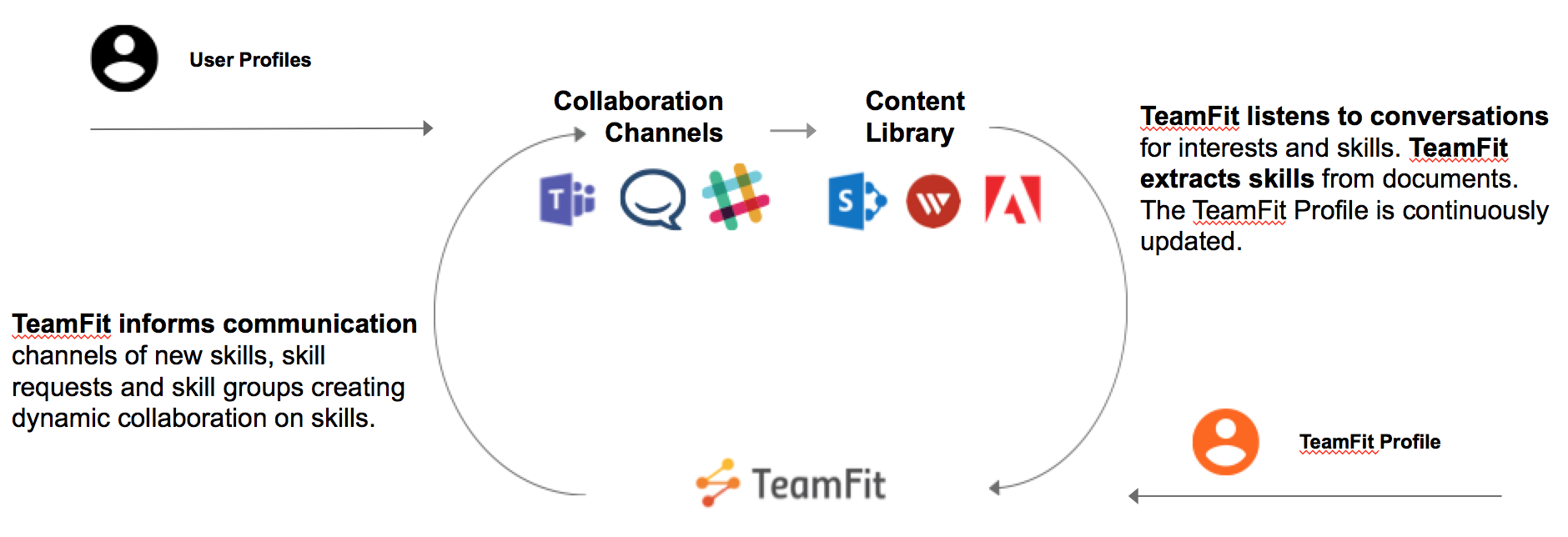Skills in the context of collaboration and communication platforms
Steven Forth is a Co-Founder of TeamFit. See his Skill Profile.
Conversations about our skills are one way we come to understand each other. Face-to-face conversations are important, but in a modern distributed workplace our collaboration tools are equally important. These now come in two main flavours, communication centric and document centric. The best approaches integrate both.
Communication-centric channels include the now ubiquitous Slack, Hipchat and now Microsoft Teams. Many teams now rely on these for their day-to-day, or even minute-to-minute, communication. Most projects will have their own channel, and some sub-channels as well. They will use these to ask questions, share updates, pass content back and forth, and to banter with each other. At TeamFit, we even have channels for music and anime as well as geekier topics around ontologies, skill models and human performance.
TeamFit is developing integrations with Slack and Microsoft Teams, and will add other platforms in response to user demand. There are two aspects to this. One is to create a skills channel where people can make expertise requests, trade ideas on how to develop skills, and suggest skills to each other. TeamFit listens on this channel and its bot can even inject its own suggestions to people (generated by the Skill Recommendation Engine) and for people who have relevant associated (skills that tend to be found together in the same person) and complementary skills (skills that two different people tend to use together).
The other functionality is to listen in on all of the conversations for evidence of interests and of skills. We are expanding the TeamFit Skill Graph to capture interests as well as skills (there are a lot of things I am interested in that I have no particular skill at, or even interest in developing real skills, like the development of neural networks or coding Bayesian networks). I still want to know who has these skills and what associated skills may support them. One can also infer expertise by listening to see who asks questions and who answers them.
Conversations are not the whole story.
Documents of various types also provide evidence of skills. We often seed TeamFit with C.V.s and résumés so that when one first uses TeamFit one has a skill profile without any work on your part. This is just the beginning. Many different forms of content can provide evidence of expertise. In my case, my Slideshare and regular blog posts provide some evidence of how my skills are developing (Slideshare, OpenView Labs, TeamFit). For other people, it is project records or white papers or patent applications. These documents do two things. They provide evidence of new skills and interests. They provide evidence of expertise, that is weighed by the TeamFit Expertise Engine, the system that assigns our expertise rankings from Newbie (1) to Guru (5). We are also investigating having certain types of documents (project records being an obvious candidate) automatically create a project record.
One way to get these documents into TeamFit is by uploading them directly (currently only supported on the backend but soon to be added to the UI). A more automated approach is to follow a content repository, such as Microsoft Sharepoint, Widen, Adobe or one of the solutions from OpenText.
Integration and automation are two of the keys to making skill profiles dynamic and current. Why keep a profile current? We talked about this last week, in the post Do you keep your profiles up to date? The short version is that there are three reasons to do so.
Skills are dynamic, they are changing as people learn new skills and apply them to projects and as new patterns of associated and complementary skills emerge
Skills are part of the conversation, as people move beyond task delivery to a focus on innovation and business impact it is critical to talk about how we can use new skills together
Skills are how we understand ourselves and our colleagues, a static and stale skill profile will not give people the insight into their own performance that they need to excel
Standalone skill management is the past. Integrations with collaboration and content management are what will drive value in the future. This makes the collaboration and content management systems themselves more valuable. By using these systems to enrich conversations with detailed and accurate skill information a virtuous circle can be built that helps to drive value creation from all the different systems in the ecosystem.




